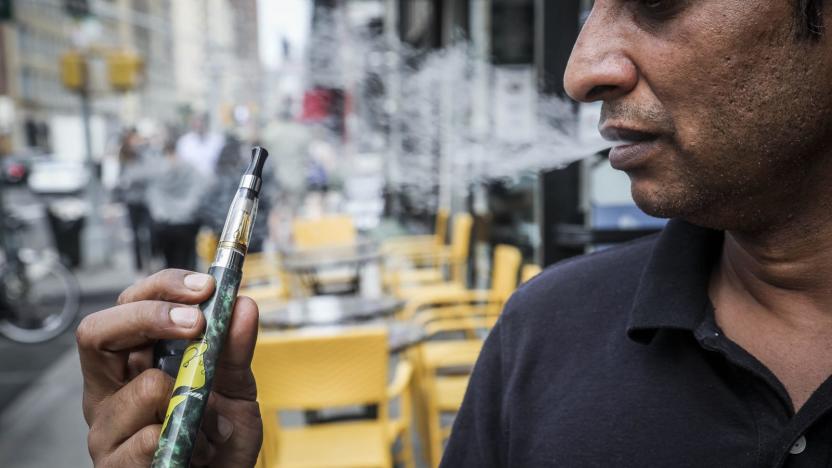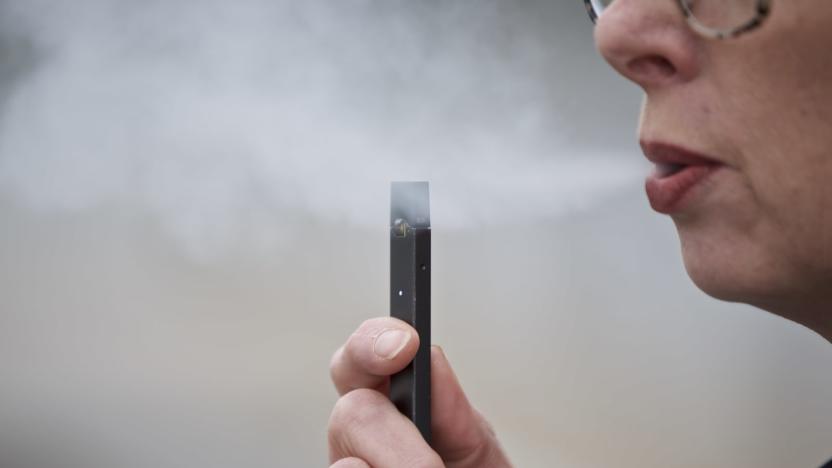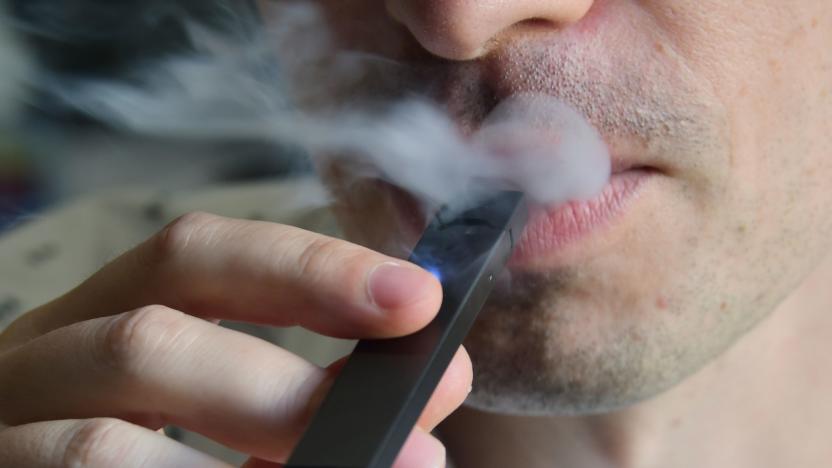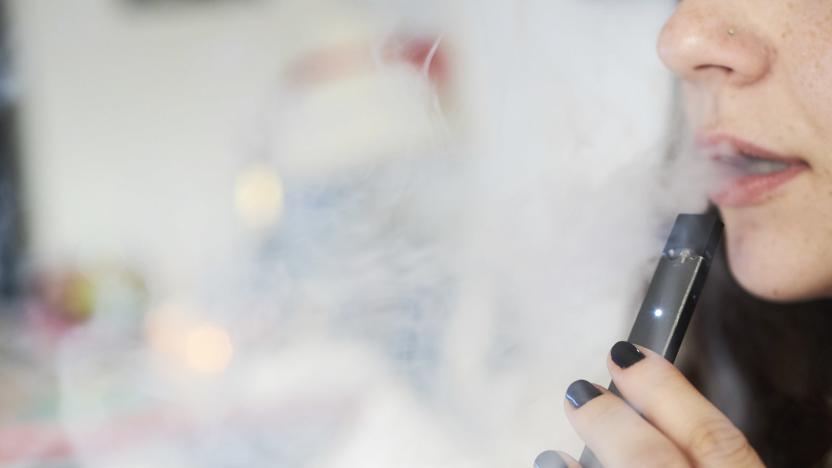foodanddrugadministration
Latest

The FDA has opened a criminal investigation into vaping
The Food and Drug Administration opened a criminal investigation into the vaping supply chain earlier this summer, it has emerged. The Office of Criminal Investigations started the probe following reports of a vaping-related lung illness. The agency now says more than 530 people have been affected, and seven deaths have been attributed to the illness thus far.

San Francisco set to become first US city to ban e-cigarettes
San Francisco has edged towards becoming the first US city to ban sales of e-cigarettes, as well as the manufacturing and distribution of them on city property. A preliminary vote saw city supervisors unanimously approve a ban on e-cigarettes the Food and Drug Administration has yet to review. It hasn't assessed any yet and companies have until 2021 to apply for reviews of their products under the agency's draft guidelines.

FDA to limit sales of flavored e-cigarettes
The Food and Drug Administration is essentially banning flavored e-cigarette sales at convenience stores and gas stations as part of a crackdown on underage vaping and smoking. The agency is limiting sales in physical stores to those that have age-restricted entry or areas that are closed off to under-18s. It will also require more vigorous age verification for online sales. It was widely expected that the FDA would take action against flavored e-cigarettes, though it stopped short of a complete ban.

Juul stops selling flavored e-cigarette pods, kills social media accounts
Juul Labs, the makers of the wildly popular Juul e-cigarettes, announced today that it will stop selling most of its flavored vaping pods in retail stores. The company will also put an end to its social media promotions and advertisements. The decision on the part of Juul comes as the government appears ready to apply more scrutiny to the vape brand and its potential targeting of kids.

E-cig makers have 60 days to show they aren’t targeting minors
The Food And Drug Administration may force several e-cigarette brands to stop selling flavored products if they can't prove they can keep their products out of minors' hands. The brands -- Juul, Vuse, MarkTen, blu and Logic -- have 60 days to convince the agency they have adequate plans to stop kids from vaping with their products. Those five collectively account for more than 97 percent of the e-cigarette market.

Theranos' Zika test is under FDA scrutiny
That didn't take long. Theranos pulled the emergency request for its Zika-testing miniLab following an FDA inspection that revealed shortcomings with patient protocol, according to The Wall Street Journal. WSJ's sources say that while the blood-testing company had data showing that the testing methods worked, the evidence collected was done without "implementing a patient-safety protocol approved by an institutional review board." Meaning, the experiments didn't have the type of oversight necessary to ensure that they were performed in stringent, controlled ways that would consistently provide accurate results and wouldn't harm the test subjects. The company says that it "recognized" that some of its data was gleaned before the needed protocols were in place. Theranos plans to appeal the Food and Drug Administration's ruling, of course, and collect the extra information requested by the FDA before trying the certification process again. Same goes for when the company attempts certification for its Ebola test as well. The miniLab itself was a way to sidestep founder Elizabeth Holmes' two-year ban from owning or running a lab or her own, precisely because the device was made for outside use. All of this raises the question of how long Jennifer Lawrence will have to wait for a final script for Theranos: The Movie. Seriously, this saga just keeps getting better.

FDA approves world's first GMO fish: fast-growing Atlantic Salmon
In a landmark decision more than two decades in the making, the US Food and Drug Administration announced its approval of a genetically modified Atlantic Salmon variant on Thursday. The AquAdvantage salmon, which was initially developed back in 1989 and submitted for approval in 1995, grows far faster than its conventionally bred brethren. The FDA has deemed it safe for human consumption, equally nutritious as other salmon varieties and not dangerous to the environment. And since the GMO salmon is considered nutritionally equivalent to regular salmon supermarkets will be able to carry the fish without having to label them being GMO.

FDA approves a drug made using 3D printing
You might be familiar with the concept of 3D-printed medical equipment, but you're going to have to get used to seeing 3D-printed medicine, too. The US Food and Drug Administration has approved its first drug manufactured using 3D printing, Aprecia's epilepsy-fighting Spritam. The medication uses a porous, 3D-printed formula to help deliver even very high doses (as high as 1,000mg) while remaining easy to swallow -- all you have to do is take a sip of liquid to quickly disperse the drug and get it into your body.

FDA makes it easy for apps to give you public health data
Want to know if it's safe to buy an unknown foodstuff or medicine when you're already at the store? You'll have that option soon. In step with the White House's open data efforts, the FDA has launched OpenFDA, a platform that makes it easy for apps to fetch public health data. Developers only need to implement some search code to pull up information; before this, they had to sift through reports or make special requests. OpenFDA only provides data on adverse drug reactions and medication mistakes right now, but it should expand to recalls and labeling after the current trial phase. You'll have to wait for the first FDA-savvy apps to roll out. Still, it shouldn't be too long before you can walk up to the drugstore counter with confidence. [Image credit: AP Photo/Kevork Djansezian]

FDA's new e-cigarette regulations target 'healthier than tobacco' claims
Proposals to officially regulate electronic cigarettes will be announced later today by the Food and Drug Administration, according to the WSJ. The regulations would include a ban on sales to minors and a requirement for health warning labels on packaging. E-cigarettes contain nicotine liquid, which is derived from tobacco -- and that's where the FDA comes in. "Right now it's like the wild, wild west in terms of what people are doing.." Importantly, makers would not be allowed to state that e-cigarettes are safer than other tobacco products ( manufacturers need to provide scientific evidence to prove these claims), nor use descriptive language like "light" or "mild" to describe goods. Companies will also be required to submit a "pre-market review application" within two years, although products will be allowed to stay on the market as long as the application is filed. Outlines will also restrict marketing on TV and any efforts to appeal to anyone under 18, although they won't immediately ban the wealth of flavored e-cigarettes that have recently flourished. FDA Commissioner Dr. Margaret Hamburg told ABC News: "Right now it's like the wild, wild west in terms of what people are doing, the products are evolving with no regulatory oversight and being marketed in ways that are very worrisome." The full list of regulations will be posted online by the FDA at 9am today.

Google adds medication to the Knowledge Graph, might ease our minds through search
It's no secret that many of us turn to Google searches for medical advice, much to the chagrin of doctors who have to contend with periodic bad attempts at self-diagnosis. Google might not have a cure for hypochondriacs, but it can stop all of us from taking risks at the pharmacy: it's adding medicine to the Knowledge Graph. Search for medication and the side results panel will bring up data from the Department of Veterans Affairs, the FDA and the National Library of Medicine. Apart from a very top-level summary of a drug's role, the Knowledge Graph will show alternative names, related drugs and (most importantly) risks. The search firm is quick to warn that it's not giving us a license to prescribe our own treatment -- we'll want to talk to someone who swore the Hippocratic Oath, if there's more than a headache. The depth of Google's new search tool could still do more to assuage worried patients than a pill bottle label.

FDA approves Proteus Digital Health's e-pills for dose monitoring
An "ingestible sensor" doesn't sound like the tastiest of snacks, but soon it might be just what the doctor ordered. A tiny microchip which activates upon contact with stomach acid has recently been given the green light by the US FDA. When the sensor is swallowed, an external patch picks up its signal and shoots a message over to whoever it's supposed to. The technology is aimed at tackling an issue known in the healthcare biz as compliance -- or, following instructions. Correct timing and dose are important for many drugs, and lax schedules can be responsible for treatment failures or the development of nasty drug-resistant bugs. Although the pills have only been used in trials, one pharmaceutical heavyweight has already bagged a license to the technology for real-world applications. If you don't like the thought of a belly full of microchips, no need to worry -- the harmless sensors pass naturally after completing their mission.

Daily Update for October 18, 2011
It's the TUAW Daily Update, your source for Apple news in a convenient audio format. You'll get all the top Apple stories of the day in three to five minutes for a quick review of what's happening in the Apple world. You can listen to today's Apple stories by clicking the inline player (requires Flash) or the non-Flash link below. To subscribe to the podcast for daily listening through iTunes, click here. No Flash? Click here to listen.

E-cigarettes contain carcinogens and toxins after all, FDA warns
In case you ever of the mindset that e-cigarettes were somehow toxin free, at least compared to the more traditional smokes, along comes the FDA to shatter your illusions. A report this week from the government agency calls out the product with a safety warning, charging that the cartridges they examined contained "carcinogens and toxic chemicals such as diethylene glycol, an ingredient used in antifreeze." The FDA says it can't confirm the extent of the health issues, as it's only done limited testing and it hasn't been formally submitted for review, but it doesn't look quite as risk-free as previously touted. Don't say the WHO never warned ya. So remind us again, what's the point in smoking one of these over an old school cigarette?[Via Switched; thanks, flatlander85]

iPods won't crash your pacemaker says the FDA
It turns out that 17-year-olds probably aren't that good at studying electrical interference -- and its effect on pacemakers -- created by iPods. Unlike the data presented to the Heart Rhythm Society last year by a high-school student, which demonstrated the music player's ability to interfere with heart-regulating devices, the FDA now says that the gadgets are completely safe for use. Researchers measured magnetic fields produced by four different models of Apple's ubiquitous device, and found no reason why your grandmother can't keep jamming to her South of Heaven reissue. Said FDA researcher Howard Bassen, "Based on the observations of our in-vitro study we conclude that no interference effects can occur in pacemakers exposed to the iPods we tested." We hope the FDA will follow this up with a definitive study on the effects of boomboxes on hip implants.







